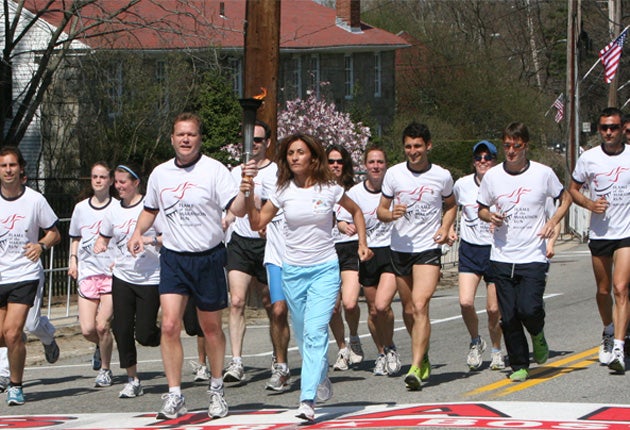2,500 years on, marathon remembered as it began

Two veteran Greek marathon runners are to celebrate the invention of their sport, 25 centuries ago this year, with a marathon series of marathons.
Maria Polyzou and Panayiotis Skoulis will run the equivalent of two marathons a day for six days to commemorate the 2,500th anniversary of the exploits of the Athenian messenger Pheidippides.
According to the most familiar version of the story, he invented not only the marathon race but the concept of "breaking news" long before satellite dishes and Twitter.
He ran 26 miles and 385 yards from the plain of Marathon to Athens in 490BC to bring news of a famous victory over invading Persians. He burst into the Athenian assembly and shouted: "Nenikekamen," – "We have won" – before collapsing and dying.
There is, however, a much earlier version of the legend in which an Athenian messenger ran first to the city of Sparta to seek reinforcements, without success, then ran to back to Athens. It is this 325-mile, mega-marathon that will be attempted by the Greek women's marathon record-holder Polyzou and the man who first repeated Pheidippides' feat in 1992, Skoulis.
They will set out from the Acropolis on Monday to run 150 miles south to Sparta before doubling back to the plain of Marathon, north of the Greek capital. Apart from sleeping, and occasionally eating and drinking, they will spend six days on the move.
Polyzou, who has been running marathons for 23 years, is director of the Athens museum of marathon running and honorary vice-president of the Greek athletic federation Segas.
"This is a special year for the sport and I want to be a part of our history," she said. "Put simply, the marathon is part of my soul."
Whether either of the legendary marathons was run is open to doubt. The Battle of Marathon in 490BC kept alive the greatest Athenian contribution to Western civilisation, namely democracy.
But there is no mention of a 26-mile dash by a messenger until Plutarch's work, On the Glory of Athens, 600 years later. The historian Lucian of Samosata told the story a century later, calling the runner Philippides.
The Greek historian Herodotus writes about a man who ran from Athens to Sparta and back for help. He makes no mention of a messenger. It was Robert Browning who merged the versions into one in his poem "Pheidippides" in 1879.
The marathon race was recreated for the first modern Olympics in 1896. The distance of 26 miles and 385 yards – roughly the distance from Marathon to Athens by the flattest route – was not standardised until 1921.
Polyzou says the marathon race has gripped the popular mind in recent years because it symbolises life. "It's a cliché," she said. "But life is like a road and every part of that road takes you further forward."
Join our commenting forum
Join thought-provoking conversations, follow other Independent readers and see their replies
Comments
Bookmark popover
Removed from bookmarks